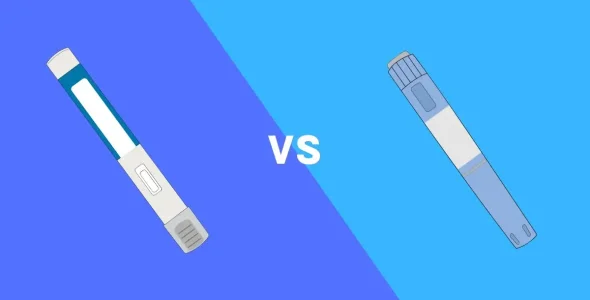How does Ozempic work? Understanding its benefits for weight loss and diabetes
Key highlights
- Ozempic (semaglutide) is a GLP-1 injectable medication approved for type 2 diabetes and is also commonly prescribed off-label for weight loss.
- It’s a once-weekly injection injected subcutaneously (under the skin) in the abdomen, front of the thigh, or upper arm.
- Ozempic (semaglutide) promotes weight loss by mimicking the GLP-1 hormone to slow gastric emptying, reduce appetite, and increase feelings of fullness by acting on receptors in the brain and gut.
According to the CDC, 42% of Americans are living with obesity. Several studies show that obesity is very closely associated with diabetes and cardiovascular diseases such as heart attack or stroke, which can lead to death.
Ozempic is an FDA-approved medication for lowering blood sugar levels in adults with type 2 diabetes and reduces the risk of serious heart problems in adults with obesity or overweight.
Clinical trials have shown that people taking Ozempic lose an average of 15% of their body weight, making Ozempic very popular for weight loss.
Learn more about Ozempic and how it works for weight loss and diabetes.
What is Ozempic?
Ozempic (semaglutide) is a brand-name medication that contains the active ingredient, semaglutide. It’s manufactured by Novo Nordisk and approved by the FDA (U.S. Food and Drug Administration) for the treatment of type 2 diabetes and reducing the risk of major cardiovascular events, including cardiovascular death, nonfatal stroke, and nonfatal myocardial infarction in adults with type 2 diabetes and established cardiovascular disease.
On January 29, 2025, the FDA approved Ozempic to reduce the risk of worsening kidney disease, kidney failure, and cardiovascular death in patients with chronic kidney disease and type 2 diabetes.
Ozempic is an injectable GLP-1 (glucagon-like peptide-1) receptor agonist administered subcutaneously once weekly. It helps control blood sugar levels by stimulating the release of insulin, suppressing glucagon secretion, and slowing gastric emptying, leading to feelings of fullness and decreased appetite. It’s commonly prescribed off-label for weight management, given its weight loss benefits.
How does Ozempic work?
Ozempic acts as a GLP-1 receptor agonist that binds and activates the GLP-1 receptor. GLP-1 agonists mimic how a natural hormone called glucagon-like peptide-1 works in the body. This hormone controls excess blood sugar levels in the body. Studies show that semaglutide has 94% structural similarity to the human GLP-1 hormone.
Ozempic works in the following ways:
1. Increases insulin release
As a GLP-1 receptor agonist, Ozempic affects the function of beta cells in the pancreas. The medication restores the sensitivity of beta cells to elevated blood sugar levels, which increases insulin release. Increased insulin secretion helps lower blood sugar levels.
A clinical study conducted a trial to test the effect of semaglutide on beta cell functions and glycemic control in patients with type 2 diabetes. The study involved 37 participants who received semaglutide and 38 participants who received a placebo. The results showed reduced fasting and postprandial blood sugar levels with semaglutide. Maximum insulin capacity increased after administering semaglutide in the semaglutide group. The study concludes that a 12-week treatment with semaglutide (once weekly) improved beta cell functions to release insulin.
2. Decreases glucagon secretion
Glucagon is a hormone that raises blood sugar levels. GLP-1 medications, including Ozempic, inhibit glucagon secretion. These medications increase insulin secretion that suppresses glucagon secretion from alpha cells of the pancreas.
3. Slow gastric emptying
Ozempic slows down the rate at which your stomach empties to give a feeling of fullness and reduce hunger cravings. The medication relaxes stomach muscles and inhibits motility of the stomach.
A clinical study shows that semaglutide injection increased gastric retention by 3.5% after 1 hour, 25.5% after 2 hours, 38% after 3 hours, and 30% after 4 hours. The medication retained 37% of a solid meal after four hours compared to zero percent retention in the placebo group.
4. Targets the brain
The lateral hypothalamus is the “feeding center” of the brain that controls appetite and drive to eat or drink. After food intake, GLP-1 is produced in the brain and intestine to suppress appetite. Ozempic occupies GLP-1 receptors in the brain to suppress appetite earlier and reduce hunger cravings. Less food intake helps manage blood glucose levels in type 2 diabetes.
Ozempic for type 2 diabetes
Ozempic improves blood sugar control in type 2 diabetes by suppressing appetite, inhibiting glucagon secretion, and slowing gastric emptying. Moreover, the medication improves the sensitivity of beta cells in the pancreas to stimulate the release of insulin. Ozempic improves HbA1c and blood sugar levels when used for a longer time.
A research study demonstrates that once-a-week subcutaneous injection of Ozempic reduced HbA1c by 0.90%, fasting blood sugar levels by 26 mg/d, and body weight by 3.43 kg after 6 months. Patients showed significant improvement in systolic blood pressure. The levels of LDL-cholesterol were significantly improved. These results were sustained for 12 weeks.
Another study indicates that after 32 weeks of semaglutide treatment, HbA1c reduced by 1.38%, fasting blood sugar levels by 56.53 mg/dl and body weight by 6.03 kg. Blood pressure, LDL, HDL, and triglyceride were also significantly improved. The results conclude that Ozempic does not only promote blood sugar control but also reduces the risk of heart disease in patients with type 2 diabetes.
Ozempic for weight loss
The mechanisms of Ozempic that help manage blood sugar also contribute to weight loss in people taking Ozempic. Reduced calorie diet, appetite suppression, and increased insulin release help manage chronic weight. Ozempic is not an FDA-approved weight loss drug. However, the medication is used off-label for weight management.
A study shows patients taking 0.5 mg and 1 mg Ozempic lost 6.19 kg weight on average after 12 months. HbA1c was reduced by -2.1%. Body mass index, LDL, HDL, total cholesterol, and triglyceride levels also significantly improved.
Administration
Ozempic is an injectable medication that is administered once weekly under the skin (subcutaneously) of the upper arm, thighs, and abdomen. It is injected on the same day each week.
The medication can be administered on the same day every week at a time that is most convenient for you, with or without meals.
Like other diabetes medications, Ozempic is taken according to its recommended dosing schedule. The dosing schedule of Ozempic is as follows:
- Ozempic starting dosage is typically 0.25 mg once weekly for the first 4 weeks.
- After 4 weeks, the dosage is escalated to 0.5 mg once weekly for the next 4 weeks.
- If additional glycemic control is required, the dose is increased to 1 mg once weekly for the next 4 weeks. The recommended maintenance dosages for type 2 diabetes are 0.5 mg, 1 mg and 2 mg.
- If a 1 mg weekly dose of Ozempic is tolerated, the dosage is escalated to 2 mg once weekly, the maximum recommended dosage for Ozempic.
- In patients with chronic kidney disease (CKD) and type 2 diabetes, the dosage is increased to a maintenance dosage of 1 mg once weekly after an initial dosage of 0.5 mg once weekly for at least 4 weeks.
Do not escalate Ozempic dosage too quickly, as Ozempic may cause severe side effects at higher doses. Follow the dosing schedule as prescribed by your healthcare provider and escalate the dosage slowly to minimize the risk of potential side effects.
Before injecting Ozempic, make sure the medication is clear and colorless. Always use a new needle with each injection. Follow these steps to safely inject the medication using an Ozempic pen:
- Wash your hands with soap and water and take a new needle.
- Clean the area where you want to inject with an alcohol swab or wipe.
- Select the dose from the dose selector and adjust it to the correct prescribed dose.
- Insert the needle into the skin. Press and hold the dose button until the counter shows 0 (count 6 seconds while keeping the button pressed).
- After injecting, remove the needle and carefully dispose of it. Put the cap back on the Ozempic pen and store it properly.
Ozempic side effects
The most common side effects of Ozempic include the following:
- Nausea
- Vomiting
- Diarrhea
- Constipation
- Abdominal pain
- Stomach problems
Serious side effects of Ozempic are:
- Acute pancreatitis
- Changes in vision (diabetic retinopathy)
- Low blood sugar levels (particularly when used with insulin or sulfonylureas
- Severe gastrointestinal problems
- Increased risk of aspiration during anesthesia and sedation
- Gallbladder disease
- Acute kidney injury
- Risk of thyroid and endocrine cancer
- Suicidal ideation
In case of allergic reaction or low blood sugar levels, immediately visit a nearby healthcare facility for immediate medical attention. If you experience any side effects while using Ozempic, consult with your healthcare professional. They may adjust the dosage or switch to another medication according to your tolerance.
Is Ozempic right for you?
Ozempic is a prescription medication, and it is not suitable for everyone. Ozempic is indicated for adults who meet the following criteria:
- Adults with type 2 diabetes
- Adults with type 2 diabetes with a risk of cardiovascular events or established cardiovascular diseases
- Adults with type 2 diabetes and chronic kidney disease to reduce the risk of worsening end-stage kidney disease and cardiovascular death
Ozempic is not suitable for pediatric use, pregnant and breastfeeding patients and individuals with type 1 diabetes. In pregnant women, Ozempic increases the risk of birth defects, macrosomia (newborn with excessive weight), and stillbirth. If you’re already taking Ozempic, stop taking the medication 2 months before planning pregnancy.
The medication has a boxed warning for thyroid tumor (medullary thyroid cancer) and MEN 2 syndrome. Additionally, if you have experienced hypersensitivity or allergic reaction to semaglutide or any ingredient of Ozempic, the medication is contraindicated for you.
Before starting Ozempic, whether for type 2 diabetes or weight management (off-label), always consult with your healthcare provider and discuss if Ozempic is a good option for you.
Frequently asked questions
How long does it take for Ozempic to start working?
Ozempic starts working as soon as you inject it. The medication takes 4-5 weeks to reach a steady level in your body. You may notice significant improvements in body weight and blood glucose levels after 5-8 weeks of starting Ozempic.
How much weight can you lose on Ozempic?
A clinical trial shows that Ozempic users lost 10-15% of their initial body weight or 10-15 kg with 2.4 mg once weekly injections of Ozempic after 68 weeks. 70-80% of patients lost 5% of their initial body weight.
What’s the difference between Ozempic and Wegovy?
Ozempic and Wegovy are similar brand names with the same active ingredient, semaglutide. Wegovy is FDA-approved for weight loss in obese and overweight adults with at least one weight-related disease. In contrast, Ozempic is indicated for patients with type 2 diabetes to improve blood sugar levels, reduce the risk for cardiovascular events such as stroke, cardiovascular death, and myocardial infarction, and manage end-stage kidney disease and chronic kidney disease in patients with type 2 diabetes. Wegovy has a higher dose strength available, 2.4 mg once weekly.
Is Ozempic covered by insurance?
Most insurance companies provide coverage for Ozempic when used as a prescription medication for its FDA-approved indication of managing type 2 diabetes. Ozempic is likely not covered by insurance companies if you do not have diabetes or use it as an off-label medication for weight management.
What are the long-term effects of Ozempic?
Long-term side effects of Ozempic include pancreatitis (inflammation of the pancreas), acute kidney injury, gallbladder issues, diabetic retinopathy, severe gastrointestinal problems, weight changes, and changes in mood and personality (commonly described as Ozempic personality). Animal studies have shown Ozempic increases the risk of thyroid tumor (medullary thyroid cancer) and MEN 2 syndrome (Multiple endocrine neoplasia type 2 syndrome). This is the reason, Ozempic is contraindicated for patients with thyroid tumors MEN2 syndrome.
Can I take Ozempic with other medications?
You can take Ozempic with other medications but you should not take Ozempic with other GLP-1 medications. When you take Ozempic with insulin secretagogues such as sulfonylureas (glipizide, glimepiride, and glyburide) or insulin, there is an increased risk of hypoglycemia (low blood sugar levels) that needs immediate medical attention.
As well, Ozempic delays gastric emptying, which can impact the absorption of other drugs, such as levothyroxine. Selective serotonin reuptake inhibitors (SSRI) and quinoline decrease blood sugar levels; always watch out for blood glucose levels when taking these medications along with Ozempic. Always consult with your healthcare provider before taking any medication with Ozempic.
Bottom line
Ozempic (semaglutide) is a GLP-1 medication that mimics the action of GLP-1 hormones to suppress appetite, delay stomach emptying, and promote insulin, which helps maintain blood sugar levels in type 2 diabetes.
The medication is FDA-approved for treating type 2 diabetes, reducing the risk for cardiovascular events, and end stage kidney disease in patients with chronic kidney disease and type 2 diabetes. The FDA recommends using the medication in combination with lifestyle changes including a reduced-calorie diet and increased physical activity. Ozempic is also used off-label to promote weight loss in obese and overweight patients.
Before starting Ozempic, speak with a healthcare provider for a personalized treatment plan and continuous monitoring. They will check your HbA1c, blood sugar levels, body mass index (BMI), and vital statistics and adjust the dosage of the medication accordingly.













